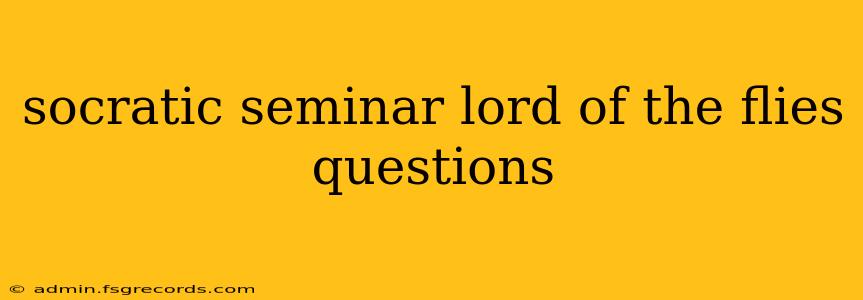A Socratic Seminar on William Golding's Lord of the Flies offers a powerful platform to explore the novel's complex themes and enduring relevance. This guide provides insightful questions designed to spark lively discussion and critical thinking amongst participants. These questions move beyond simple plot recall, encouraging deeper analysis of character motivations, symbolism, and the novel's overarching message about human nature.
Part 1: Character Analysis & Motivation
This section focuses on understanding the individual characters and their actions within the context of the island setting.
1. Ralph vs. Jack: A Clash of Civilizations:
- How do Ralph and Jack represent contrasting aspects of human nature? Consider their leadership styles, their responses to fear and desperation, and their ultimate fates.
- What are the strengths and weaknesses of each leadership style? Which approach is more effective, and under what circumstances?
- Analyze the evolution of Ralph and Jack throughout the novel. What events trigger significant shifts in their behavior and beliefs?
2. Piggy: The Voice of Reason:
- What is Piggy's role in the novel? Is he merely a comic relief character, or does he serve a more significant purpose?
- How does Piggy's intelligence and intellectual capacity contrast with the physical strength and primal instincts of other characters?
- Why is Piggy's death such a pivotal moment? What does it symbolize about the loss of intellect and reason in a chaotic environment?
3. Simon: The Prophet and Outsider:
- What is the significance of Simon's encounter with the "Lord of the Flies"? How does this scene relate to the novel's broader themes?
- Consider Simon's mystical insights and his attempts to communicate these to the other boys. Why is he unable to fully articulate his vision?
- Discuss Simon's role as an outcast. How does his marginalized status contribute to the narrative?
Part 2: Exploring Themes & Symbolism
This section delves into the deeper meaning and symbolism embedded within the narrative.
1. The Island as a Microcosm:
- How does the island setting function as a microcosm of the larger world? What aspects of society are mirrored in the boys' experience?
- Analyze the symbolic significance of the different locations on the island (e.g., the beach, the forest, the mountain). What do these places represent?
- Consider the novel's exploration of civilization vs. savagery. Is it a simple dichotomy, or is the reality more nuanced?
2. The Conch Shell: Order and Authority:
- What is the symbolic importance of the conch shell? What does it represent throughout the novel?
- How does the destruction of the conch signify the loss of order and civilized behavior?
- What other symbols are prominent in the novel (e.g., the fire, the spectacles, the Lord of the Flies)? What do these symbols represent?
3. The Nature of Evil:
- Is evil inherent in human nature, or is it a product of specific circumstances? How does Lord of the Flies explore this question?
- Analyze the gradual descent into savagery. What factors contribute to this process?
- How does the novel challenge the reader's understanding of morality and ethics?
Part 3: Relevance and Interpretation
This final section explores the enduring relevance of Lord of the Flies and allows for personal interpretation.
1. Modern-Day Applications:
- How does Lord of the Flies relate to contemporary issues, such as political polarization, social unrest, or environmental destruction?
- Can the events depicted in the novel be seen as a cautionary tale about the dangers of unchecked power or groupthink?
- What lessons, if any, can be gleaned from the boys' experiences on the island?
2. Open-Ended Discussion:
- What is your overall interpretation of Lord of the Flies? What are the most significant themes or messages?
- What questions did the novel leave you with?
- How has the novel impacted your understanding of human nature and society?
This collection of Socratic Seminar questions aims to facilitate a rich and engaging discussion, encouraging critical thinking and deeper engagement with the complex themes of Lord of the Flies. Remember to foster respectful dialogue and allow for multiple perspectives to emerge. The goal is to explore, analyze, and ultimately deepen understanding of this timeless classic.

